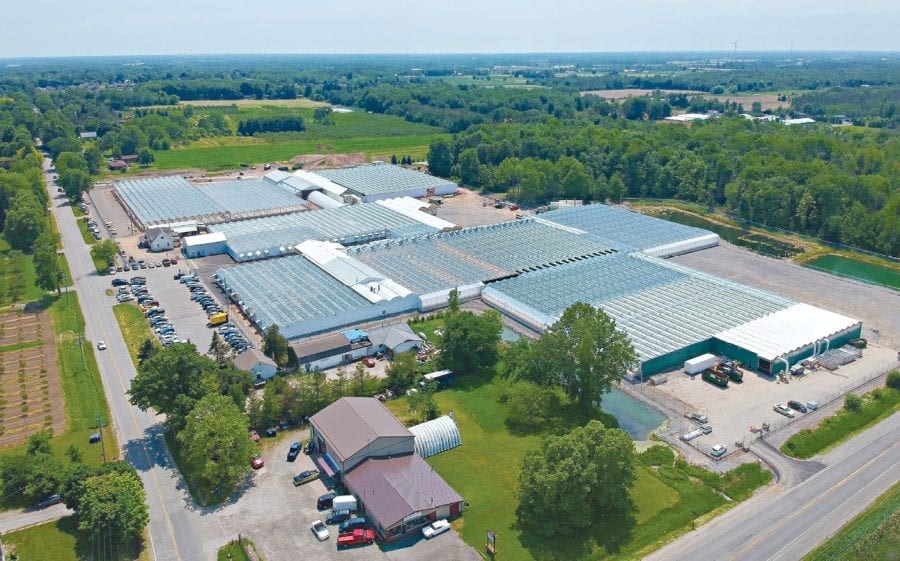Report from U.S. market research firm shows Canadian growth stalling
BY JOHN CHICK Special to the VOICE
A report from a U.S. market research firm that indicated underwhelming numbers in the first few months of legalized cannabis sales in Canada is not of major concern to one of Pelham’s grow-op operators, CannTrust CEO Peter Aceto said.
The report from Brightfield Group suggested that Canada’s cannabis industry will be worth just $5 billion by 2021 — significantly less than previously estimated. However, most of the data in is based on recreational sales.
 “Our reputation really is based on the medical business,” Aceto told the Voice, asserting that CannTrust is the fastest-growing medical cannabis company in Canada, with approximately 60,000 patients using its products.
“Our reputation really is based on the medical business,” Aceto told the Voice, asserting that CannTrust is the fastest-growing medical cannabis company in Canada, with approximately 60,000 patients using its products.
Part of their current and future plans do include recreational sales, but Aceto points to both a slower rollout of product across the market as well as Canadian regulatory issues as clear effects on Brightfield’s numbers.
“Medical cannabis has been legal in Canada for five years,” Aceto said. “Recreational cannabis has been legal for four months. The underlying reason why recreational cannabis was legalized was to try and eradicate the black market, and to make sure that it gets up to healthy standards.”
In short, people who want to smoke a blunt after work are probably still buying marijuana from their longtime suppliers. The cannabis industry in Canada, on the other hand, still faces regulatory hurdles with products such as edibles and vapors.
Still, some of Brightfield’s numbers seemed surprising.
“To give you some context, in Colorado, with a population of four million, they sell about a billion dollars worth of cannabis in a year,” Brightfield’s Bethany Gomez told the Financial Post. “When the recreational market was announced here in Canada, there was so much hype and hope that the rollout was going to be strong. We didn’t see that.”
It’s still early days, said Aceto, adding that Colorado has had legalized cannabis sales since 2012. Throw in the evolving regulatory factor, and you have the numbers seen in Canada.
“I feel pretty certain that, you know, Canada has been much more restrictive than you would've seen in the State of Colorado,” he said.
Yet the news in Brightfield’s report wasn’t necessarily positive for the medical cannabis industry either. According to their numbers, Canada’s market in that space was worth $532 million last year — growing to a relatively low $652 million by 2021 because of competition from the more-accessible recreational market. From a consumer standpoint, however, the lines between the two markets figure to blur somewhat over time, and the data did not include the black market.
Regardless, Aceto is not complaining yet about the often drawn-out regulatory tendencies of governments in Canada.
“No, I think that, in terms of quality, in terms of all these types of things, the goal is to eliminate the black market,” he said. “I think a problem that may happen slower than people had hoped for, and [for some] it's actually probably more convenient to [consume] through the black market.”
Stats Canada estimates that on average, legal cannabis costs $9.70 per gram, which is up to 50 percent more than the same amount on the black market.
“All the talk today is that demand is outstripping supply, right?” Aceto said. “So I think this [report] very much flies in the face of that.”
Still, some financial analysts are warning of a bubble within the legalized cannabis industry. CannTrust closed last Friday’s TSX session at $9.92 a share on a market cap of over $1 billion.
However, Canada remains one of the leading cannabis-consuming nations in the world, and a separate report from another cannabis market research agency, Arcview, pegs the edible market alone in North America to reach $4 billion by 2022.
Aceto said CannTrust owns patents on various recreational products and plans to roll them out as Canadian regulations evolve.
“We're quite focused on the edibles market,” Aceto said. “But we call it cannabis 2.0 because it's not just edibles. There's other things like rubs, if you've got arthritis or pain in your joints.”
CannTrust currently employs 285 people at its Fenwick site. The company is moving forward this year with a large-scale expansion of its grow-op after beating the Town of Pelham’s interim control bylaw to the clock last October.



